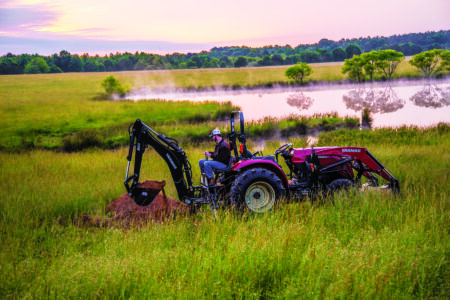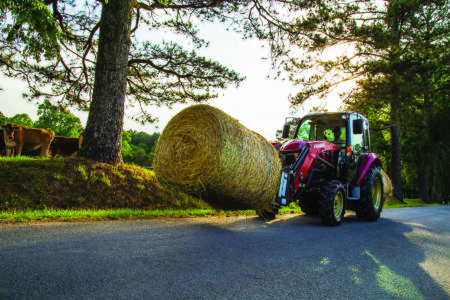You’ve decided to take the financial plunge because your back just won’t take all the lifting. You’ve put off those earth-moving projects long enough, but you need a machine that can do much more than dig. In two years, you want to make a little hay, but the driveway needs grading too. You’ve decided that a compact tractor will fit the bill, but there are so many choices. And what does shuttle-shift transmission really mean?
When it comes to choosing a first tractor, the process can be daunting, but armed with a little implement understanding and machinery know-how, you can learn to speak the dealer’s language and get what you need.
Compact tractor models have proliferated in North America ever since Japanese manufacturers defined the market back in the 1960s. Today, the compact tractor arena is crowded with models that run the gamut from economy to entry level to fully tricked out. Add variations in chassis size and weight, widely ranging engine power, and transmission choices that are almost continuously variable, and you have a decision-maker’s mess on your hands. Figuring out what you need is a little more difficult than figuring out what you want, but the process need not be as daunting as it initially appears.
Begin with the Basics
Every tractor worth considering will have a clean, fuel-efficient diesel engine, transmission(s), rear 3-point hitch, rear drawbar, one or two power take-off (PTO) points, and a hydraulic system. Most of the tractors also will be equipped with four-wheel drive (if it’s optional, I’d nearly always recommend investing in the option), a loader (invariably worth the money), and occasionally a backhoe or other mounted rear attachment. You should think of the tractor as a pulling/pushing machine as well as a platform for attaching and powering implements and other tools as diverse as emergency home generators, snow plows, and belly-mounted finish mowers. Basic tractors without any attachments will cost anywhere from about $10,000 to well over $30,000, depending on their power rating, size, and the level to which they’re appointed with high-end engines, transmissions, and hydraulic systems.
Power to the People
One of the first questions you’ll need to answer in your quest for the perfect tractor relates to power — PTO power and pulling power. Unfortunately, most makers lead with net engine power, because it’s a larger number than PTO power, but PTO power is important to know when you plan to run PTO-powered implements, such as rear shredder mowers and rotary tillers. The PTO power rating will determine the size of mower or tiller you can efficiently run with the tractor, not whether you can run one at all. If you need to mow with a 6-foot wide mower, you’ll need more PTO horsepower than if you mow with a 4-foot-wide model. For most rural enthusiasts, PTO power in the 25 to 50 hp range should suffice.

Since many makers offer several tractor chassis sizes in overlapping hp ranges, you’ll also want to consider the weight of implements and other devices you plan to push or pull with the tractor. In general, the more the machine weighs, the more traction you’ll have for moving and stopping. So, if you’re like me and love the sound of a direct-injected, turbocharged diesel engine’s turbo spooling up, consider carefully whether you really need that extra power compared with the non-turbocharged engine. If you really don’t need it, save yourself some money and buy what you need, rather than what you want. Likewise, if you need more PTO power, but not a heavier platform, consider making the power upgrade in a smaller chassis machine.
Directional Forces
Compact tractor makers have gone to great lengths to market new machines that “drive just like your car.” What that really means is that designers have taken the traditional operating steps out of the operator’s realm. There was a time when small tractors of all kinds had at least two, and sometimes three, gear selector levers: One controlled the speed range (high/low), one the speed (first through fourth gears), and many had a separate control lever for direction called a shuttle (forward/reverse).
For folks with plenty of tractor experience, this vintage-style setup makes complete sense, and the need to stop and clutch the tractor to change gears isn’t an issue. Many of the more recent compact tractors have traded their traditional transmissions for a hydrostatic version that employs one or two pedals to control both speed and direction. An even newer variation on the pedal-controlled transmission theme is the continuously variable transmission (CVT), which uses mechanical speed modulation instead of hydraulic flow. In both cases, the “easy” transmission options add quite a bit to the tractor’s price tag.
Generally, if you plan to do a lot of direction and speed changes, such as with intensive front-end loader work, the hydro or CVT will make that work easier and arguably more efficient. The next best option would be a tractor with a synchronized or automatic clutching shuttle shift transmission. That way, you’d only need to slow and clutch for the directional changes. If money is worth more than convenience or your time, then you can go for the traditional straight gear transmission. You’ll need to stop, clutch, and make a transmission shift to change directions, but in other operations, such as field mowing, the hydro, CVT, or shuttle options don’t offer much advantage under most conditions.
Dealing with Your Dealer
Face it, compact tractors simply aren’t available from your local box store. It’ll be difficult to make an anonymous purchase, as you’ll have to interface with your local dealer. If your only dealership experience lies in negotiating for an automobile, try to put as much of that out of your mind as possible. A tractor purchase is the beginning of a long-term relationship (tractor service life is measured in hours and translated into decades in most cases, not years), and your dealer stands to make more profit from you over the years through the sale of parts, accessories, implements, utility vehicles, and other extras. You can help ensure a good dealership experience by doing a little homework on the brand or brands you’re interested in, and knowing exactly how you foresee using the tractor. Be upfront about what your spending range is, but know that there’s some room for negotiation.
If the initial discussion makes you uncomfortable, feel free to admit that you don’t know or understand something. Ask more questions, but resist the urge to finalize the decision during that discussion. Instead, take notes, go home, and do more research before coming back to the table.
Finally, insist on sufficient training and a significant test drive — most dealers will deliver a loaner machine to your place for a few days — before pulling the trigger. If you don’t like the way a machine works, test drive another make or model. If you ultimately don’t like the dealer, find another in your area. Once you make your purchase, read the owner’s manual, keep safety your No. 1 priority, and turn all that farm work into fun!




